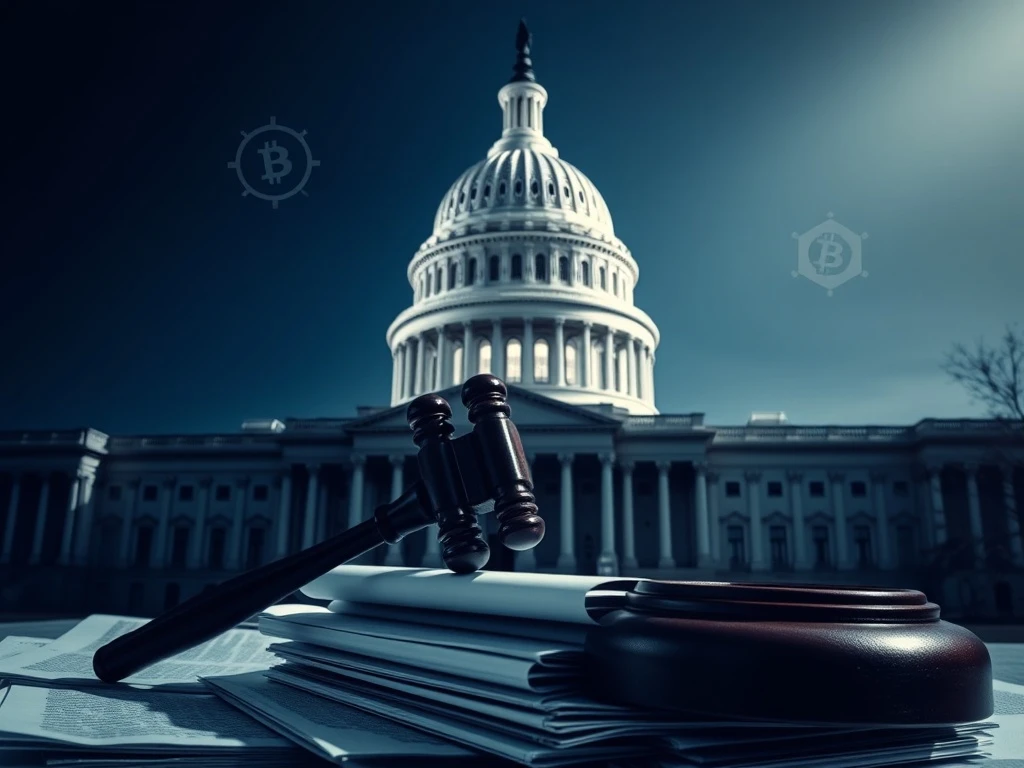Crucial Crypto Legislation Advances: US Lawmakers Reshape Digital Asset Oversight

The landscape of digital assets in the United States is undergoing a seismic shift as crypto legislation takes center stage in Washington D.C. As lawmakers race against the clock before the critical August recess, pivotal bills are being debated and passed, setting the stage for a new era of regulation. For anyone invested in or curious about the future of digital currencies, understanding these legislative moves is paramount.
The GENIUS Act: A Breakthrough for Stablecoin Regulation?
A significant milestone has been achieved with the passage of the Guiding and Establishing National Innovation for US Stablecoins (GENIUS) Act. This landmark bill, swiftly signed into law by President Donald Trump, establishes a clear stablecoin regulation framework for payment stablecoins. This move is designed to bring much-needed clarity and stability to a rapidly evolving segment of the crypto market.
- OCC Oversight: The Office of the Comptroller of the Currency (OCC) is mandated to regulate standalone stablecoin issuers.
- Existing Institutions: Stablecoins issued by existing financial institutions fall under the purview of the Federal Reserve, FDIC, and National Credit Union Administration.
- Industry Impact: Companies like Circle and Ripple are actively pursuing bank charters to align with these new regulatory requirements, signaling a shift towards greater institutional integration.
This bipartisan effort reflects a growing consensus on the necessity of a structured approach to digital currency, especially concerning their use in payments. The act aims to foster innovation while safeguarding consumer interests and financial stability.
Shaping Digital Asset Oversight: What’s Debated in the Senate?
While the House has made strides, the Senate is currently embroiled in contentious debates over key bills that will define comprehensive digital asset oversight. The Digital Asset Market Clarity (CLARITY) Act and the Anti-CBDC Surveillance State Act are at the forefront of these discussions. These legislative efforts aim to:
- Clarify Jurisdictions: Establish clear regulatory boundaries between the Securities and Exchange Commission (SEC) and the Commodity Fures Trading Commission (CFTC) regarding crypto assets.
- Address Market Structure: Develop a robust framework for digital asset markets, ensuring fair and transparent operations.
- Oppose CBDCs: Counter the development of central bank digital currencies, reflecting concerns about privacy and government control.
Senate Republicans have introduced their own framework, the Responsible Financial Innovation Act, which seeks to refine the approach to digital asset oversight. The discussions are complex, marked by partisan divides and concerns about potential conflicts of interest, highlighting the intricate political landscape of crypto policy.
Why is a Clear Regulatory Framework Crucial Now?
The primary objective of these legislative pushes is to establish a comprehensive regulatory framework that provides certainty for market participants. A major challenge in the crypto space has been the ambiguity surrounding which digital tokens qualify as securities under US law. The Responsible Financial Innovation Act, in particular, is anticipated to offer a more holistic approach to market structure compared to the House’s CLARITY Act. This clarity is vital for businesses seeking to innovate and for investors looking for protection.
Challenges in Implementation:
- Leadership Gaps: Delays in confirming key regulatory leaders, such as the CFTC chair, threaten to impede the implementation of new rules. With only two active commissioners at the CFTC, both set to depart before 2026, the agency’s capacity to enforce new regulations faces uncertainty.
- Political Gridlock: The Senate’s deliberations are often characterized by partisan disagreements, making it challenging to achieve consensus on complex financial legislation.
The urgency to finalize these bills before the August recess reflects the pressing need for a stable and predictable environment for digital assets.
Navigating US Crypto Law: What’s Next for the Industry?
As Congress navigates the intricacies of US crypto law, stakeholders are closely monitoring the legislative calendar. There’s a strong push, championed by figures like Wyoming Senator Cynthia Lummis, to potentially extend the session to address pending nominations and other critical crypto agenda items. The outcome of the Senate’s review of the CLARITY and anti-CBDC bills will directly shape the US digital asset ecosystem, impacting everything from stablecoin operations to interagency regulatory coordination.
Shifting Political Tides:
- The Trump administration’s active embrace of digital assets, including executive orders to build a bitcoin reserve, has significantly accelerated the shift towards structured oversight.
- Despite this momentum, challenges persist, particularly in balancing innovation with robust risk management.
- Past events, such as the FTX collapse in 2022 and the SEC’s enforcement-driven strategy under Gary Gensler, have left lingering trust issues, complicating the path to legislative consensus.
While the GENIUS Act represents a crucial first step, analysts suggest that broader legislation will be necessary to address existing gaps in market structure, enhance investor protections, and improve interagency collaboration. The initial aim to finalize key bills before August recess has been revised to September, underscoring the political and procedural hurdles in establishing a cohesive regulatory framework.
Conclusion
The rapid advancement of crypto legislation in the US signifies a pivotal moment for the digital asset industry. From the swift passage of the GENIUS Act to the ongoing, often intense, debates in the Senate, Washington is clearly moving towards a more defined and structured approach to digital asset oversight. While challenges remain—from political divides to regulatory capacity—the current momentum indicates a clear commitment to integrating cryptocurrencies into the mainstream financial system. The coming months will be crucial in determining the final shape of US crypto law, impacting innovation, investment, and the overall stability of the digital economy.
Frequently Asked Questions (FAQs)
1. What is the GENIUS Act and what does it regulate?
The GENIUS (Guiding and Establishing National Innovation for US Stablecoins) Act is a landmark US law that establishes a regulatory framework specifically for payment stablecoins. It mandates the Office of the Comptroller of the Currency (OCC) to regulate standalone stablecoin issuers, while stablecoins from existing financial institutions fall under the Federal Reserve, FDIC, and National Credit Union Administration.
2. How will the new legislation impact companies like Circle and Ripple?
With the GENIUS Act signed into law, companies like Circle and Ripple, which issue stablecoins, are now pursuing bank charters. This move aims to align their operations with the new regulatory structure, potentially leading to increased oversight but also greater legitimacy and integration into the traditional financial system.
3. What are the key differences between the House and Senate approaches to crypto regulation?
The House has advanced bills like the GENIUS Act and a version of the CLARITY Act. The Senate is debating its own versions, including the Responsible Financial Innovation Act introduced by Republicans, which aims for a more comprehensive market structure approach. Senate debates are often more contentious, with partisan divides influencing the outcomes, especially regarding regulatory jurisdictions for the SEC and CFTC.
4. Why are there concerns about delays in implementing new crypto regulations?
Delays are primarily due to partisan divides, the complex nature of the legislation, and, critically, the slow pace of confirming key regulatory leaders. For instance, the Commodity Futures Trading Commission (CFTC) faces uncertainty with only two active commissioners, both set to leave soon, which could hamper its capacity to enforce new regulations effectively.
5. How does the Trump administration’s stance affect crypto legislation?
The Trump administration has shown an embrace of digital assets, including executive orders related to building a bitcoin reserve. This stance has accelerated the legislative shift towards structured oversight for cryptocurrencies, providing momentum for bills like the GENIUS Act.
6. What role do the SEC and CFTC play in the ongoing legislative debates?
A major focus of the legislative debates, particularly with the CLARITY Act and Responsible Financial Innovation Act, is to clarify the regulatory jurisdictions of the SEC (Securities and Exchange Commission) and the CFTC (Commodity Futures Trading Commission). This aims to define which digital tokens are considered securities versus commodities, providing much-needed clarity for market participants.









